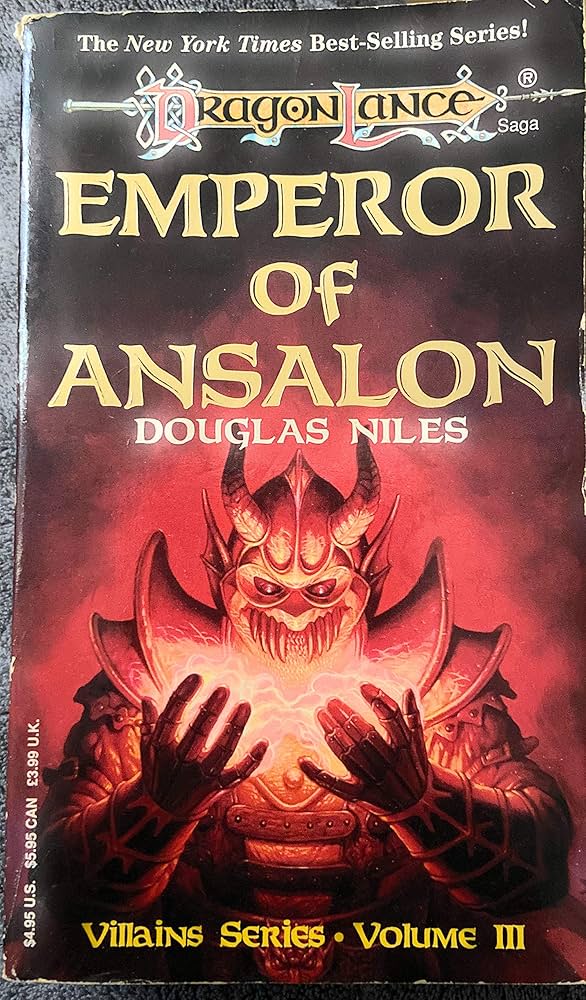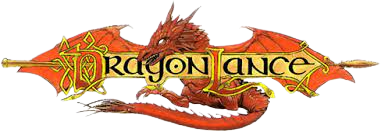Emperor of Ansalon

Table of Contents
ToggleOverview
Emperor of Ansalon, written by Douglas Niles, is the concluding volume in the Rise of Solamnia trilogy within the Dragonlance universe. Picking up after the chaos of civil unrest and political upheaval in Solamnia, this novel follows Sir Jaymes Markham as he steps fully into power—no longer just a knight, but a ruler with the fate of a fractured realm in his hands.
As Solamnia teeters between rebirth and ruin, Emperor of Ansalon explores themes of leadership, legacy, and the fine line between necessary authority and creeping tyranny. It is the crescendo of a trilogy about building something noble in a world that no longer believes in nobility.
Main Character: Sir Jaymes Markham
Now emperor in all but name, Markham shoulders the enormous responsibility of unifying Solamnia under a single vision.
Once a reluctant leader, he is now a calculating ruler whose idealism must compete with brutal pragmatism.
Markham’s arc tests whether power can be wielded wisely without being corrupted by it.
Supporting Characters
Beldinas Pilofiro – The spiritual compass of the series, now offering both support and challenge to Markham’s authority.
Marra – A common-born advisor whose growing influence symbolizes the new Solamnia Jaymes hopes to create.
Liam Ehrling – Represents the old ways and traditionalist resistance, providing friction and reflection.
Ambitious Nobles – Serve as reminders that internal threats are often more dangerous than open rebellion.
Setting
Solamnia remains the central focus, from its grand castles to its war-torn borderlands. The empire Markham tries to forge is not born of conquest, but of fragile coalitions, reform, and hard-won diplomacy.
The world of Krynn is still recovering from the War of Souls, and the scars of divine absence haunt every attempt at stability.
The capital becomes a symbol of possibility—and of the cost of centralizing power.
Plot Summary
With rebellion suppressed and the knighthood restructured, Markham begins reshaping Solamnia into a united empire. But peace brings new challenges: political dissent, ethical compromises, and the dangerous allure of unchecked authority.
He enacts sweeping reforms, elevating the common people, streamlining the knightly orders, and tightening control over the regions. These changes draw praise and fury alike.
Plots against him emerge from within his own ranks. Meanwhile, foreign powers eye Solamnia’s rise with suspicion. Markham must outmaneuver betrayal, resist hubris, and hold fast to the vision that brought him this far.
In the climax, he is forced to confront his darker impulses—whether to become the tyrant everyone fears or the visionary his people need. The resolution reaffirms his commitment to justice, but not without personal loss and painful clarity.
Themes
The Burden of Leadership – Markham is constantly reminded that to lead is to sacrifice.
Reform vs. Tradition – The novel explores how to honor the past while building a future.
Power and its Price – Can an empire be just, or does all authority eventually corrupt?
Faith in Mortals – In a world still abandoned by gods, the book emphasizes human agency and moral choice.
Tone & Style
Emperor of Ansalon is sober, politically intense, and philosophically rich. It offers fewer battlefield heroics and more council chambers, policy debates, and emotional reckoning.
The prose is clean and dialogue-driven, with reflective pacing that allows deep character development and tension to unfold.
Reception
The novel is praised for:
A satisfying conclusion to Markham’s arc.
Depth of political and moral exploration in a fantasy setting.
Expanding Dragonlance beyond magic and war into civic rebirth.
Some critiques:
Limited magical or epic fantasy elements.
Slower pace may not appeal to action-first readers.
Final Thoughts
Emperor of Ansalon is a bold, grounded, and emotionally resonant finale to a trilogy that redefines heroism for a new age of Krynn. It asks hard questions about power, purpose, and the future of a broken world.
Jaymes Markham’s journey from mercenary to emperor is not just the tale of one man—but of an entire realm learning how to hope again.
Recommended for:
Readers interested in political fantasy and statecraft.
Fans of morally complex, character-driven storytelling.
Dragonlance enthusiasts looking for post-war reconstruction done right.
